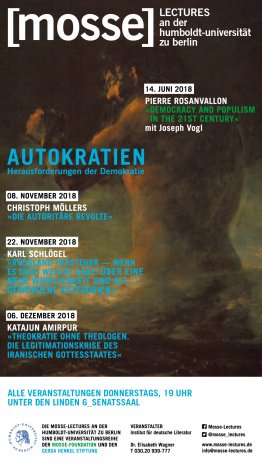After the end of the Cold War great hopes had been placed that necessarily more and more states would ‘democratize’, more or less. However, since the turn of the century these expectations were disenchanted rapidly. Under the pressure of widely spread fears of globalization, the growing influence of populist movements, and marked by economic and security risks, autocracy has become a political option: a form of government based on self-empowerment, monopolization, and strengthening itself by excluding the ‘others’. In the 1990ies, in its geopolitical strategies, the research of democracy, mandated mostly by western states, was convinced that a worldwide change of system could be observed. In this context conceptions of autocracy leading back to the studies on totalitarianism of the postwar period were largely misleading. In our days autocrats gain power in the manner of populism, and last but not least, executing techniques and practices of neoliberal governance. Once in power they pretend to serve ‘the people’, gaining authority with promises of prosperity, religious and moral renewal, forceful expansion. Autocracies can best be understood as hybrid forms of executing power, brusquely interweaving the social systems of economy, politics and law. In this series of the Mosse-Lectures the principal task will be to identify, historically and presently, the specifics of this type of power: the ‘electorate autocracy’ in Vladimir Putin’s Russia, Recep Erdogan’s conception of an Islamic presidential autocracy, the progression of Iran’s theocracy, the digitally supported backup of the one-parts-rule projected in China, not to forget the autocratic tendencies in Europe and the United States, questionable in terms of constitutional law.
- Winter Semester 2024/25
- Summer Semester 2024
- Winter Semester 2023/24
- Summer Semester 2023
- Winter Semester 2022/23
- Summer Semester 2022
- Winter Semester 2021/2022
- Summer Semester 2021
- Winter Semester 2020/2021
- Winter Semester 2019/2020
- Summer Semester 2019
- Winter Semester 2018/2019
- Summer Semester 2018
- Winter Semester 2017/2018
- Summer Semester 2017
- Winter Semester 2016/2017
- Summer Semester 2016
- Winter Semester 2015/2016
- Summer Semester 2015
- Winter Semester 2014/2015
- Summer Semester 2014
- Winter Semester 2013/2014
- Summer Semester 2013
- Winter Semester 2012/2013
- Summer Semester 2012
- Winter Semester 2011/2012
- Summer Semester 2011
- Winter Semester 2010/2011
- Summer Semester 2010
- Winter Semester 2009/2010
- Summer Semester 2009
- Winter Semester 2008/2009
- Summer Semester 2008
- Winter Semester 2007/2008
- Summer Semester 2007
- Winter Semester 2006/2007


